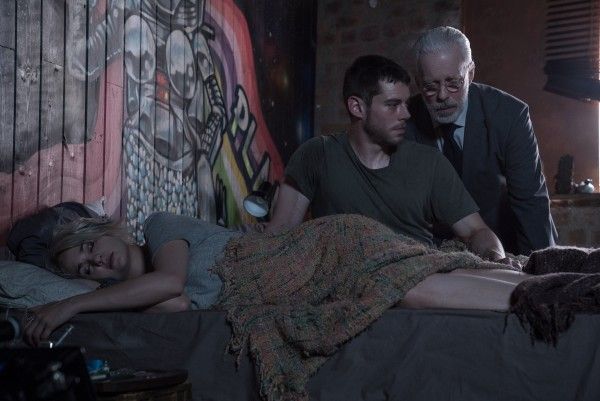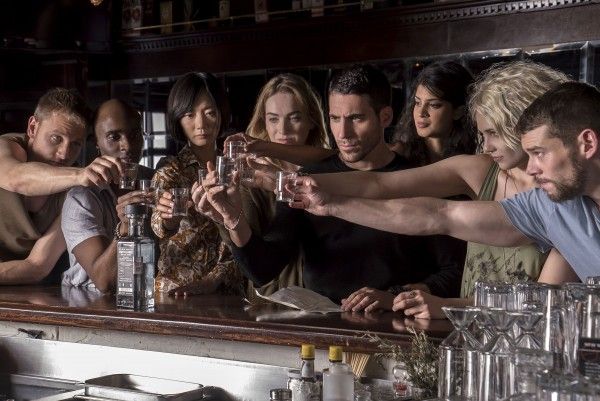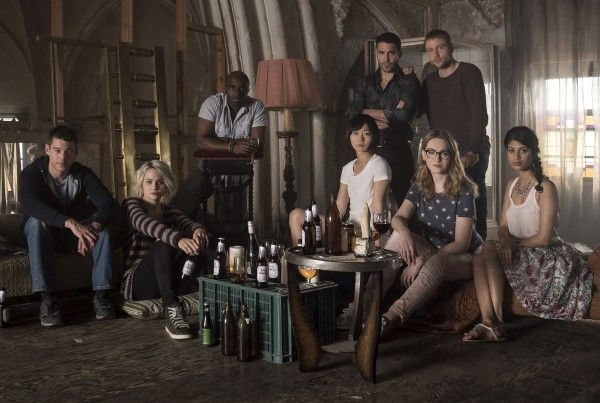For all the rampant science-fiction mumbo-jumbo that was discussed throughout The Matrix, it's not exactly hard to follow. The sickly tinted world of the titular system allows for moderate comfort and the illusion of self-definement, whereas the grim, grey world outside offers reality and all the grueling misery, death, and constant uncertainty that goes with that. The movie had (and still has) a distinct look, an original and unfathomably influential visual rhythm, and all the talk about fake steaks, Zion, the Oracle, and lord knows what else never hampered that. The 1999 smash continues to be the only movie by the Wachowski siblings where this can be said.
This is as true of the bloated, mythology-sick Matrix sequels as it is of the second season of Sense8, their science-fiction series on Netflix. The newest episodes - I've seen five of them - continue to focus on the fight between a "cluster" of eight sensates, who have the power to communicate telepathically and take over one another's bodies, and a rogue sensate named Mr. Whispers (Terrence Mann), who fronts an organization called BPO (Biologic Preservation Organization) who wants to wipe out his own kind. For much of these episodes, their interactions are mostly just acts of one-upsmanship. One involves a long tete-a-tete between Whispers and Will (Brian J. Smith), one of the sensates, lifting details of their location from small observations of their respective environs. Another one involves two people getting stabbed in the throat with a pen.
The story of Sense8 isn't really what's interesting about the Wachowski siblings' Netflix series. Well, it is in a way: it's in the structure of the narrative, constantly giving equal weight to all eight central characters, each one of which is representative of segments of the population not always served so well by TV, movies, or the media in general. Jamie Clayton's Nomi is a transgender hacktivist with a bookish girlfriend, Amanita (Freema Agyeman), while Sun (Doona Bae) is a South Korean underground fighting champion. Other characters hail from Iceland, Berlin, Nairobi, Mumbai, and Spain, where newly outed gay movie star Lito (Miguel Ángel Silvestre) must fight against a wave of not-so-subtle blacklisting in the Mexico City movie industry. There's something genuinely heartening about seeing a drama purposefully making sure that so many cultures are represented consistently throughout the narrative, even if one does get a sense (regularly) that the Wachowski siblings were sold on the importance of their series on that alone.
Indeed, outside of this not-unimportant gesture and seemingly sincere ambition to tell stories that are easily ignored in the entertainment industry due to an overriding timidity, Sense8 is not particularly memorable for much more than its sheer surfeit of story and brisk pacing. In the writing, the Wachowski siblings press an outdated and deeply uninteresting moral purity in the sensate, to the point that the characters can come off as benevolent, oft-tortured saints rather than real people dealing with extraordinary powers. They're seen as a cluster of moral absolutes, which makes everything they do good (in one way or another) and everything anyone obstructing them either evil, misguided, or flat-out stupid. As a result, there's little tension and the characters don't grow much. Even when the plot turn itself isn't predictable, the outcome of each confrontation, physical or otherwise, can be easily prognosticated.
Even this might have been excusable if the Wachowski siblings' trademark issues didn't remain. Each character spends a great deal of the episode explaining their actions, laying out extensive mythologies and histories that informed those characters, and telegraphing what will happen next to the point that you wonder if the writers and directors have any confidence in their audience whatsoever to understand what's going on. So little of what is said between these characters exposes anything truly revealing about who these characters are, and the imagery, though consistently competent, never pauses long enough to actually let composition speak for what can't be translated into words. Aside from the engaging cast, the serpentine path of the plot and the sheer volume of story become the only elements of the series that really stick out. Draped in dubious timeliness, Sense8 is finally more interested in a bad joke and a good fight than recognizing the more challenging aspects of battling racism, sexism, homophobia, transphobia, bigotry, and protectionism.
The Wachowskis are so enamored by the power of connection that they strip their characters of any sense of an individual inner life, a world of private thought and impulses that comes out in arguably dismissible ways, whether it be a gesture or a movement of an eyebrow. This tactic may very well be on purpose - to promote the importance of working together and seeing the power of a united fight - but it leaves Sense8 feeling unmistakably and frustratingly shallow. In essence, the Wachowski siblings have stumbled onto the most problematic issue with unity - the complicated individual must be tamed to fit in with the peaceful whole - but there's no confronting of this issue in the drama. For all its evident ambition, and its veneer of inclusion, Sense8 is no more interested in the messy details of progress than The Avengers.
Rating:★★
Sense8 Season 2 is now available to stream on Netflix.







